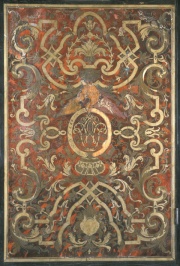Difference between revisions of "Boule-work"
Jump to navigation
Jump to search
m (Text replace - "== Authority ==" to "== Sources Checked for Data in Record ==") |
|||
| Line 8: | Line 8: | ||
boule; buhl; boulle; boulework | boule; buhl; boulle; boulework | ||
| − | == | + | == Sources Checked for Data in Record == |
* Tom Rowland, Noel Riley, ''A-Z Guide to Cleaning, Conserving and Repairing Antiques'', Constable and Co., Ltd., London, 1981 | * Tom Rowland, Noel Riley, ''A-Z Guide to Cleaning, Conserving and Repairing Antiques'', Constable and Co., Ltd., London, 1981 | ||
Revision as of 13:12, 29 April 2016
Description
An elaborate inlay technique named for Andre Boule in 1673. Boule-work used Tortoiseshell, Ivory, Ebony, Bone, Horn, Mother-of-pearl, Silver, and Brass. Although used in Italy during the 16th century, Boule-work became popular in 17th century France during the reign of Louis XIV. The furniture surface was typically covered with designs in brass then filled with inlays.
Synonyms and Related Terms
boule; buhl; boulle; boulework
Sources Checked for Data in Record
- Tom Rowland, Noel Riley, A-Z Guide to Cleaning, Conserving and Repairing Antiques, Constable and Co., Ltd., London, 1981
- George Savage, Art and Antique Restorer's Handbook, Rockliff Publishing Corp, London, 1954
- The American Heritage Dictionary or Encarta, via Microsoft Bookshelf 98, Microsoft Corp., 1998
